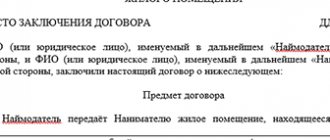Renting an apartment for temporary residence is not difficult. Usually, when the search for a suitable option is completed, drawing up a rental agreement for residential premises and then exchanging keys for money takes no more than an hour. At the same time, future tenants are not always attentive to the conclusion of the contract, however, it is its terms in the event of a conflict between the parties that will be decisive.
Legal instructions 9111.ru will tell you what you need to pay attention to when concluding a rental agreement for residential premises.
Residential tenancy agreement - what do you need to know?
According to Russian law, if one citizen rents an apartment from another, then this is called renting a residential premises, and not renting, as is commonly believed. The transaction will be called a lease if one of the parties is a legal entity. In our case, the owner of the property is called the landlord, and the tenant is called the tenant (Clause 1, Article 671 of the Civil Code of the Russian Federation). However, do not be alarmed if the rental of residential premises is referred to as a lease in the agreement; this does not make such an agreement invalid, it is simply drawn up incorrectly.
The rental agreement for residential premises is drawn up in writing (clause 1 of Article 609 of the Civil Code of the Russian Federation) and certified by the signatures of the parties. It is necessary to make two original copies if the agreement does not undergo state registration, and three if it does.
The contract is often certified by a notary, but this does not guarantee the employer greater protection of rights in the event of disputes between the parties, since the notary only certifies the authenticity of the signatures and the legal literacy of the document.
The maximum term of a residential lease agreement is five years. If the contract does not specify a period, it is considered to be concluded for five years (Article 683 of the Civil Code of the Russian Federation).
If the lease agreement is concluded for a period of up to one year, then the encumbrance in the form of the right to use residential premises is not subject to state registration, if more than a year, then it is subject to on the basis of Art. 674 Civil Code of the Russian Federation.
Essence and content of the rental agreement
This agreement is consensual, bilaterally binding, as a rule, compensated (with the exception of social tenancy agreements), as a rule, urgent.
The rental agreement for residential premises is concluded in writing[4].
A typical rental agreement involves reaching agreement on all essential terms of the agreement (object, term, price). The remaining conditions are not essential and are included in the contract at the request of one of the parties.
The object of the agreement may be an isolated residential premises suitable for permanent residence (apartment, residential building, part of an apartment or residential building)[5]. The suitability of premises for habitation is determined by housing legislation, the Housing Code of the Russian Federation in particular (Article 15 of the Housing Code of the Russian Federation).
Subject of the agreement
The purpose of the rental agreement is to ensure the transfer of residential premises at the specified address for temporary use. This section provides the characteristics of the rental property and the condition of the sanitary equipment.
How to check the owner's credentials?
The lessor of a residential premises can only be its owner or owners, if there are several of them. Their signatures must be on the contract. If one of the owners for some reason cannot personally sign the document, then this must be done by his authorized representative using a power of attorney certified by a notary. If one of the owners is a minor child, then it should be borne in mind that if his rights are violated during the rental of housing, then in any dispute it is the child who will be considered as a weak party in the contract, therefore, as a rule, his interests will be protected as a priority .
The owners confirm their authority with a certificate of ownership of the residential premises. However, this is not enough to check the legal purity of the apartment, since the certificate does not reflect possible encumbrances of rights, such as pledge, lease, arrest, etc. The full picture can be found out by contacting the Federal Registration Service to obtain an extract from the Unified State Register of Rights to real estate and transactions with it. To apply to the Unified State Register, participation, as well as consent, of the owner is not required.
FINAL PROVISIONS
7.1. The parties have read the text of this Agreement and fully agree with it.
7.2. This Agreement comes into force from the moment it is signed by both Parties.
7.3. All changes and additions to this Agreement are valid provided they are in writing and signed by both Parties.
7.4. If disputes arise, the Parties will strive to resolve them through negotiations, and if no agreement is reached, in court.
This is important to know: Contract for hiring an employee without official employment in the state: sample 2020
7.5. On issues not covered by this Agreement, the Parties are guided by the legislation of the Russian Federation.
7.6. This Agreement is drawn up in two copies having equal legal force, one for each Party.
Document type: Residential lease agreement
To save a sample of this document to your computer, follow the download link.
There are two parties involved in such an agreement. These include the Landlord (the owner of the residential premises) and the Tenant (the citizen who decides to rent the property).
Are realtors responsible for the purity of the transaction?
Often, tenants are afraid to independently enter into an agreement with the owner of the apartment and resort to the help of realtors, hoping that they will take responsibility for the purity of the transaction. However, real estate agencies and real estate firms provide only information and consulting services - they are intermediaries in the transaction. In order to hold them accountable for the purity of the transaction, it is necessary to include in the contract between the employer and the agency a condition on compensation for damage by the latter if the transaction is declared invalid, and penalties for the intermediary if he violates the terms of the contract. It is also advisable to provide in the contract with the intermediary the right of the employer to refuse to fulfill the contract at any time.
Essential and non-essential terms of the contract
In order for the contract to be considered concluded, it must describe in detail the residential premises that are transferred to the tenant for a fee: the location of the apartment (address, entrance number, floor), total and living area, number of rooms. This is an essential condition of the tenancy agreement.
If the residential premises are transferred for use with furniture, appliances, etc., then it should be listed in detail and the condition described, including the cost at the time of transfer. This will allow us to avoid future disputes between the parties.
Payment for residential premises is another essential condition of the contract. If the amount of the fee is not determined, the contract may be considered not concluded. The fee may include utility and maintenance fees. It is advisable to regulate in what time frame and in what way payment will be made, as well as what document will confirm the fact of transfer of payment. The tenant is recommended to either take a receipt from the owner for each payment transfer, or have a payment schedule in which the owner will personally indicate the date and amount of payment, and also put his signature under these records.
When concluding a rental agreement, other rights of the tenant should be provided for, including the right to have members of his family and pets, if any, live with him.
Since during the period of residence in the apartment the tenant may incur costs for its arrangement: purchasing furniture, household appliances, carrying out repairs upon arrival, etc., it is in his interests to stipulate in the contract the procedure for compensating his costs, for example, by reducing the volume of his obligations for rent or reimbursement of costs upon termination of the contract.
Upon termination of the contract, the tenant has the right to take with him all separable improvements, and inseparable ones, provided that the corresponding investments have been agreed upon with the owner (Article 623 of the Civil Code of the Russian Federation). To avoid conflicts, the contract should explicitly stipulate what compensation the employer will be able to receive for his investments.
The contract should provide for the tenant's preemptive right to extend the contract or conclude it for a new term.
The contract should indicate that, on the basis of Art. 675 of the Civil Code of the Russian Federation, the transfer of ownership of residential premises occupied under a lease agreement does not entail termination or modification of the lease agreement. In this case, the new owner becomes a lessor under the terms of the previously concluded rental agreement.
It is also advisable to establish contractual jurisdiction for all disputes, choosing the most conveniently located district court in case of disputes, and indicate addresses for sending notifications.
RESPONSIBILITY OF THE PARTIES AND THE PROCEDURE FOR EARLY TERMINATION OF THE AGREEMENT
5.1. Early termination of the Agreement is possible due to its early termination or due to the unilateral refusal of either Party to fulfill it on the grounds specified in this Agreement.
5.2. Unilateral refusal to fulfill the Agreement before the expiration of the period specified in clause 1.6 of the Agreement may be made by any Party if the other Party systematically violates the terms of this Agreement.
5.3. Termination of this Agreement by way of unilateral refusal is carried out by sending one of the Parties to the Agreement to the other Party, a corresponding written notice indicating the reason for the refusal, no later than calendar days before the date of termination of the Agreement.
5.3.1. In the event of a unilateral refusal to fulfill the Agreement at the initiative of the Tenant, subject to the Landlord’s compliance with the terms of this Agreement, the return to the Tenant of a portion of the money proportional to the unused rental period can be made by the Landlord only at his voluntary request.
5.3.2. In the event of a unilateral refusal to fulfill the Agreement at the initiative of the Landlord, subject to the Tenant's compliance with the terms of this Agreement, the Landlord returns to the Tenant the portion of the amount paid by the Tenant for the unused rental period and pays a penalty in the amount of the monthly rent for the Object.
This is important to know: Federal Law 426 “On special assessment of working conditions”, 2020 edition
5.4. The Tenant bears full financial responsibility for damage caused to the Object and/or the property of the Landlord, for damage caused to the owners of adjacent premises, regardless of whether this damage is the result of intentional actions or the result of negligence of the Tenant and or persons living with him.
5.5. In case of delay in payments under this Agreement, the Tenant shall pay the Landlord a penalty in the amount of % of the amount due for each day of delay.
Expert opinion
Kurtov Mikhail Sergeevich
Practitioner lawyer with 15 years of experience. Specializes in civil and family law. Author of dozens of articles on legal topics.
5.6. Termination or termination of this Agreement does not relieve the Tenant from fulfilling the obligation in accordance with clause 5.5 of this Agreement.
5.7. If during the execution of this Agreement it is revealed that the Lessor has violated clause 2.3 of the Agreement, namely the fact that he has provided false information that prevents or makes it impossible to use the Facility, the Lessor is obliged to pay the Tenant a fine in the amount of the monthly rental rate of the Facility.
5.8. If the Tenant discovers, in the process of executing this Agreement, the Landlord's debt in payments for the Property, which complicates or makes it impossible for the normal use of the Property for living (electricity, gas, etc.) to be used, the Tenant has the right to independently repay the identified debt at the expense of the amount of payment due to the Landlord for hiring the Object.
5.9. The Parties are released from liability for failure to fulfill their obligations under this Agreement if the cause of this was force majeure events and/or factors beyond their control and beyond the control of the Parties, such as: natural disasters, armed conflicts, regulations of government authorities and public administration, significantly complicating or making impossible the fulfillment of obligations assumed under the Agreement.
Acceptance of residential premises by the tenant
When accepting the premises, it is necessary to draw up a transfer and acceptance certificate, which must be signed by the parties to the agreement. The act must reflect the condition of the premises and the property that is transferred along with it, so that upon return there is something to compare with. It is in the interests of the tenant to indicate the existing defects in the report, since in the future he will have to be responsible for the shortcomings of the returned premises and property.
The court will not take into account the unsubstantiated assertion of the tenant that he initially received the premises and property in poor condition, in the presence of a transfer and acceptance certificate signed by him without objection indicating the good condition of the premises and property.
Housing law: Conditions for terminating a contract
The contract should provide for the procedure and conditions for terminating the contract. In accordance with the Civil Code of the Russian Federation (Article 687), before the expiration of the term, the contract can be terminated at any time by agreement of the parties. If the initiator of termination of the contract is the tenant, then he must notify the landlord about this three months in advance. At the initiative of the landlord, the contract can only be terminated through the court, if there are certain conditions, which can be found in the legal instructions How to properly rent out housing>>
It should be remembered that losses during the execution of the contract may be incurred not only by the owner, but also by the tenant, for example, due to the need to rent another residential premises due to the termination of access to the rented one on the initiative of the landlord. In this case, the tenant has the right through the court to demand compensation for losses caused to him, related, for example, to the costs of renting alternative housing.
OBLIGATIONS AND RIGHTS OF THE HIREROR
2.1.1. Transfer to the Tenant, under a deed of transfer, an object suitable for living, meeting the necessary sanitary and technical requirements usually required for residential premises.
2.1.2. When the Tenant leaves the Property, return the security deposit to him (clause 6.1 of this Agreement) after the Tenant presents to the Landlord paid bills, receipts, in accordance with clause 4.5 of the Agreement and confirmation of the safety of the property leased, minus the corresponding debts of the Tenant for payments and/or compensation property damage.
2.1.3. Notify the Tenant in writing no later than days before the expiration of this Agreement about your intention to renew the Agreement on new terms or refuse to enter into a new agreement, as well as about the upcoming alienation of the Object (exchange, sale, donation, etc.) for three months before alienation.
2.1.4. Be responsible for the shortcomings of the leased Property and the property located in it that impede its use, even if at the time of concluding the Agreement the Lessor was not aware of these shortcomings.
2.1.5. Eliminate the consequences of accidents and damages that occurred through no fault of the Tenant and/or persons living with him, using his own efforts.
2.1.6. Provide the Tenant with the opportunity to reside in the Property within calendar days from the date the Tenant receives from the Landlord a notice of early termination of this Agreement. The notification must be in writing.
Expert opinion
Kurtov Mikhail Sergeevich
Practitioner lawyer with 15 years of experience. Specializes in civil and family law. Author of dozens of articles on legal topics.
2.2. The Lessor has the right to check the condition of the Property and the property located in it once a month at a time previously agreed upon with the Lessee.
2.3. The Lessor guarantees that at the time of signing this Agreement: it disposes of the Property on a legal basis - the document of law specified in clause 1.4 of this Agreement.
This is important to know: Fixed-term employment contract with a foreign citizen: sample 2020
The object is not leased, not alienated, is not under collateral, is not under arrest, and is not the subject of any dispute; the consent required by law from all owners and/or adult users of the Facility to conclude this Agreement has been obtained.






